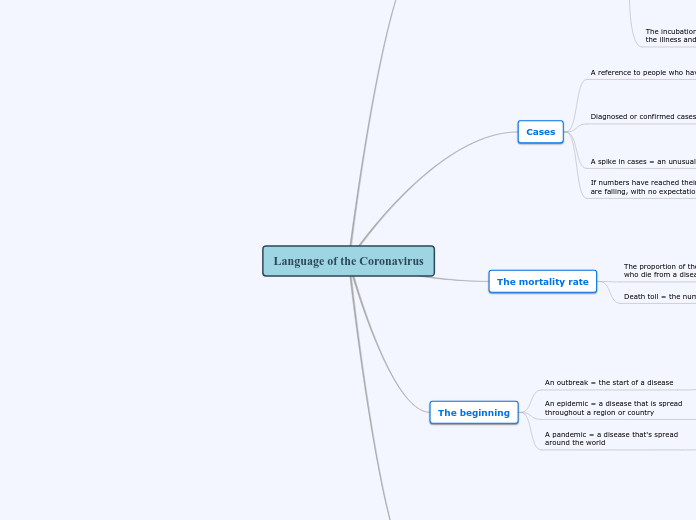Language of the Coronavirus
Contracting the virus
Becoming infected
Infectious and contagious
People that pass it are called carriers
People that seem to be more infectious
are known as super-spreaders
Patient zero
The first person to get a new disease
Signs of illness = showing / displaying symptoms
Symptoms of the Coronavirus include the following
Fever
Cough
Respiratory difficulty
The incubation period = period between catching the illness and showing symptoms
Cases
A reference to people who have a disease
Diagnosed or confirmed cases
Tests done by doctors and are sure that people have it
If doctors find out someone has a disease,
the test is positive
A spike in cases = an unusually high number
If numbers have reached their highest level and are falling, with no expectation of rising again
A peak of cases
The mortality rate
The proportion of the people
who die from a disease
Death toll = the number of people who have died
The beginning
An outbreak = the start of a disease
The outbreak happened in Wuhan, China
An epidemic = a disease that is spread throughout a region or country
A pandemic = a disease that's spread
around the world
The Coronavirus (COVID-19) is classified as a pandemic
The government
A decision on how to control and
contain the spread of the virus
Towns and cities have put people on lockdown
Nobody can enter or leave
Some countries have closed their borders = stopped letting people from other countries in
Some countries have also suspended flights
= prevented people from flying to certain places
People who may have contracted the disease
are put in quarantine = staying away from other people
People that are returning from an area
with the coronavirus are asked to self-quarantine
Voluntarily stay away from other people
Despite the debate on the effectivness of face masks (mouth and nose covers)
Some countries have seen large queues for them
Scientists are racing to develop a vaccine
= medicine to prevent people from contracting the virus
